Let’s cut to the chase. We’re experts in SEO for the healthcare industry and have seen first-hand how it offers the best returns on investment for medical practitioners. In this blog, we’ll explain how to increase your leads and revenue with a few SEO tweaks.
What Is Medical SEO?
Medical SEO (or Healthcare SEO) improves the ranking of healthcare websites in major search engines so healthcare practitioners, treatment centers, and hospitals can reach more potential patients searching for their services.
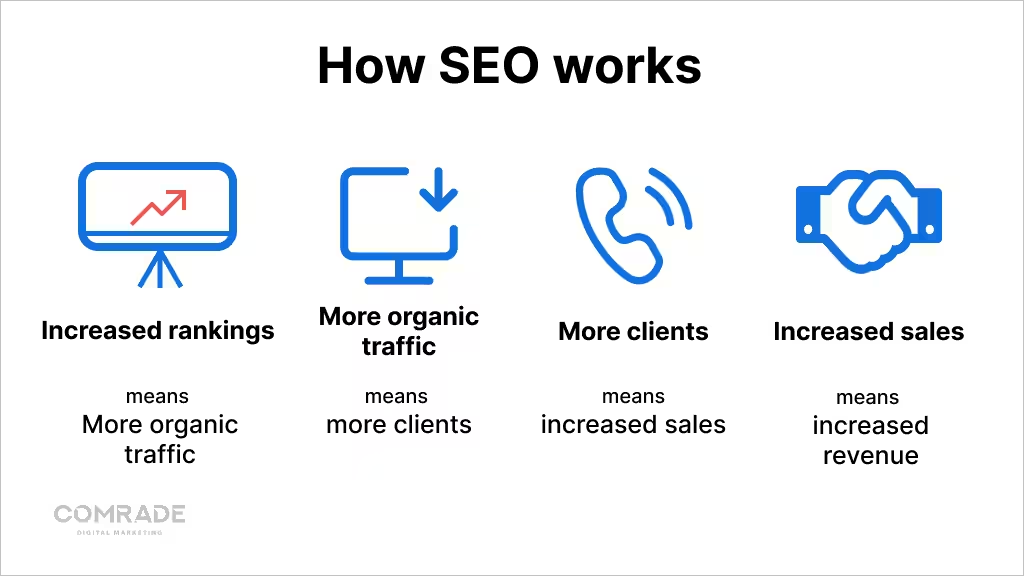
Every time a search occurs on Google, its algorithm decides which pieces of content to rank first based on keyword selection and other factors.
The goal of search engine optimization is to improve the quality of your website and marketing content so search engines rank you higher within search results. This increases online visibility, and the number of organic leads your web content receives.
Common tasks associated with medical SEO strategy include creating and optimizing high-quality content around specific keywords, ensuring your medical practice website is technically sound, and building a strong backlink profile and local SEO presence.
Just because the accuracy of an online search for health information is dubious, doesn’t mean the internet isn’t an excellent resource for finding practitioners. Google searches are increasingly replacing word-of-mouth referrals with nearly as much as 70% of patients searching online for a “doctor near me.”
Getting online is the easy part. The difficult part is getting noticed. That’s why healthcare SEO strategy is so important to the vitality and longevity of your healthcare business.
What Are the Benefits of Healthcare SEO?
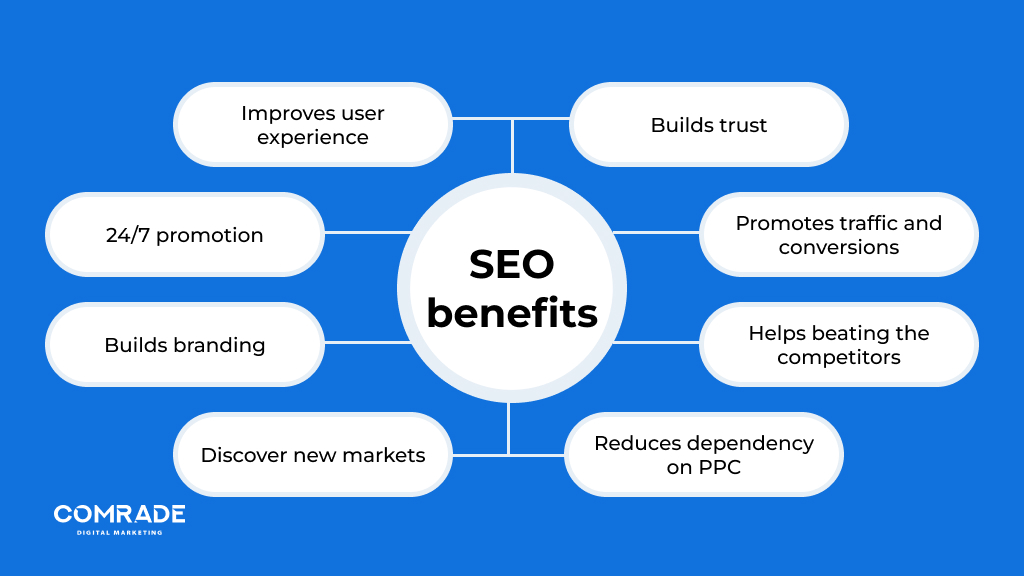
SEO, or search engine optimization, can be a powerful tool for any business, but especially for healthcare businesses. And here’s why:
- Increased website traffic: According to a study by HubSpot, businesses that invest in SEO see a significant increase in website traffic. In the healthcare industry, this can translate to a significant boost in new patient leads.
- Attraction of new patients: A study shows that 77% of patients use search engines to find healthcare providers. By optimizing your website for relevant keywords, you can ensure that your practice appears at the top of search results, making it more likely that potential patients will find you.
- Increased brand awareness: When your website appears prominently in search results, it helps to increase brand awareness among potential patients. This can lead to more people choosing your practice when they need healthcare services.
- Improved patient trust: A study found that 72% of patients trust online reviews. By optimizing your website for local search and ensuring that you have positive online reviews, you can build trust with potential patients and encourage them to choose your practice.
- Cost-effectiveness: SEO is a long-term marketing strategy that can be very cost-effective. Once you have optimized your website for SEO, you can continue to attract new patients and leads without having to spend money on advertising.
In short, healthcare SEO can be a powerful tool to boost your presence in the medical industry. With the right strategy, you can use SEO to reach more customers and establish yourself as a leader in the industry.
12 Search Engine Optimization Tactics for Medical SEO Success
No matter the size and specialty of your medical practice, these SEO tips will provide a high degree of local market visibility and improve your bottom line.
1. Improve Your Healthcare Website Speed
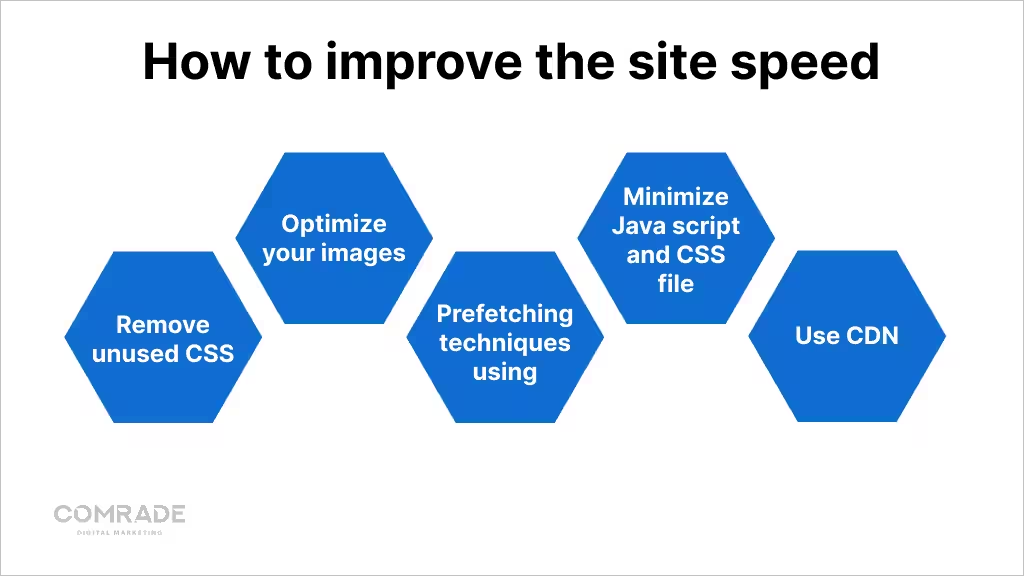
Every website owner wants their site to rank well on search results pages. However, not many people know that a site’s speed can affect its SEO rankings.
Good site speed is the foundation of a good user experience, and it can lead to more time spent on-site and higher conversion rates. A fast site also means that the search engine crawler will spend less time crawling your pages, which in turn means your content will be indexed quicker, and your search engine rankings also will improve. Investing in optimizing your site’s speed is an integral part of an on-page healthcare SEO strategy.
47% of people expect a webpage to load in 2 seconds or less. When patients visit your website, their first impression is based on how fast it loads. If it’s too slow, they’ll leave and go directly to your competitors.
Additionally, website speed is a prominent search engine ranking factor. Google will rank a slow-loading website lower, regardless of how good its content is.
The easiest way to determine your website’s speed is to use the Google PageSpeed Insights (PSI) tool. It reports on the performance of your website on desktop and mobile and suggests improvements.
2. Produce High-Quality Medical Content
Quality medical content is not just vital for on-site SEO for healthcare providers, but it’s also the key to ranking high in search engines. Remember: quality medical content is the key to a successful website.
Since medical content is so important, it needs to be created with care and attention. This care, as well as the right keywords, will ensure that it ranks higher in search results pages and provides accurate information for users. There are two main aspects to this high-quality content:
- Each page on your website and every content marketing asset must serve a clear function.
- The content must be original, well-written, and researched.
To search engines, quality content gives searchers what they’re looking for (delivers value). For businesses, it drives search traffic and sales.
Quality medical website content is well-researched, planned out, and strategically created to answer your patients’ questions. A staggering 7.5 million blogs are published daily, so the only way to stand out is to create the best content possible!
Google’s E-A-T algorithm ranks content according to expertise, authority, and trust and is a good guideline to follow when developing your content strategy.
Skyrocket your content marketing strategy with Comrade Digital Marketing Agency. Schedule a free consultation.
3. Make Sure Your Healthcare Website Is Easy to Crawl
Crawlability is the extent to which a website can be found and indexed by search engine crawlers. It is one of the most important factors in determining how well a website ranks in Google searches.
As Google has started using its artificial intelligence to rank websites, it has become even more important for SEO professionals to make sure that their client’s site is crawlable.
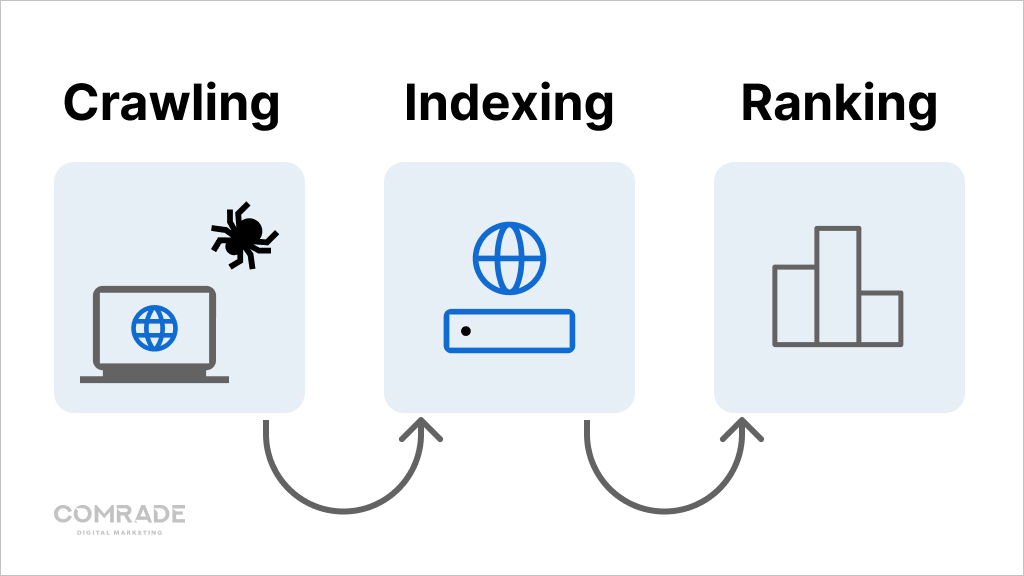
This is part of technical SEO and entails:
- Having a logical website structure;
- Interlinking internal web pages and blogs; and
- Getting rid of broken links.
As a healthcare SEO agency, we often come across poor link structures that hinder search engines. Always ensure your website’s internal link structure helps search engines understand the relevance of certain web pages, as well as the relationship between pages.
4. Optimize Your Medical Website for Mobile Devices
Mobile optimization is not just about having a responsive website. It’s about making sure that your medical website is optimized for all aspects of the user’s experience, especially when it comes to on-site SEO for medical practices. Mobile optimization can be challenging and time-consuming, but it can also be an opportunity for healthcare organizations like yours to stand out in an increasingly competitive market.

The healthcare industry is faced with the challenge of optimizing content across multiple channels, and mobile is hugely important because of the integral part it plays in consumers’ daily lives.
Did you know over 50% of website traffic comes from mobile devices? Both search engines and people using smartphones and tablets favor mobile-optimized devices. In fact, Google indexes the mobile version of all websites.
Websites optimized for mobile use ensure users have a great experience regardless of the device they’re using. This type of optimization alters your website content for ease of use and accessibility and improves rankings on search engine results pages (SERPs).
5. Use the Relevant Healthcare Keywords to Create Content
Effective medical SEO marketing starts with relevant keywords. These are the words and phrases your potential patients enter into search engines. In the marketing world, we call them “search queries.” The use of relevant keywords in content creation is a major factor in Google search engine optimization. Using relevant keywords will help a page rank better on search engines. The higher the ranking, the more organic traffic that the site will receive.
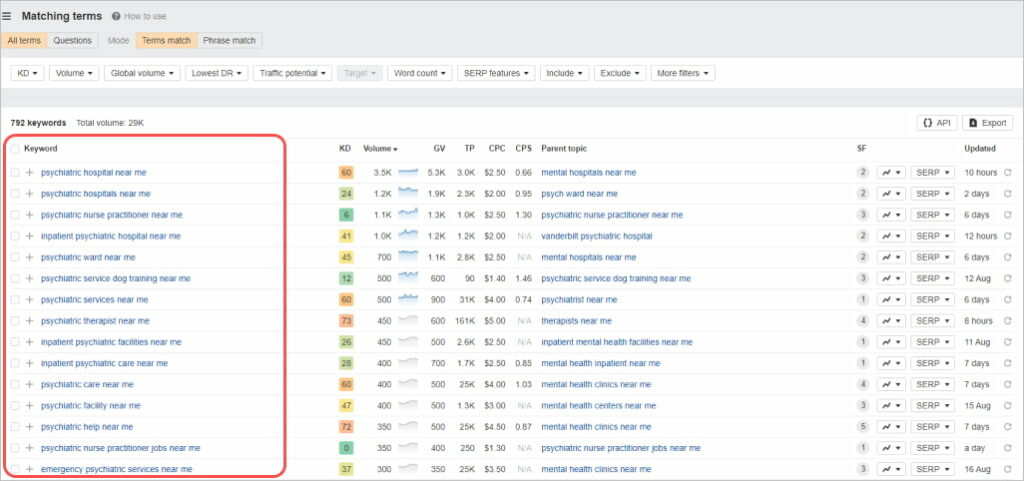
It is important to note that there are two types of keywords in SEO for healthcare industry: long-tail and head terms. Long-tail keywords are phrases that are descriptive or specific to a particular topic. Head terms typically refer to broad topics and have high commercial value. When optimizing your content for healthcare SEO, both of these types of keywords should preferably be used.
Using tools like Moz, Ahrefs, and Google Keyword Planner can help you figure out which keywords are most relevant to your healthcare organization. Why does this matter? Well, if you’re a mental health practitioner, you want to avoid popping up in local searches related to cardiology.
As a starting point, you can also think of the types of things a potential patient might Google when seeking your health services online.
6. Enhance Your Medical Website with Strategic Interlinking
Interlinking plays a crucial role in optimizing healthcare websites for search engines. It involves the strategic placement of internal links within the website’s content. By linking relevant pages together, interlinking not only helps search engines understand the website’s structure and hierarchy, but also enhances user experience by providing easy navigation and access to valuable information. Here are some best practices for medical website SEO interlinking:
- Link to high-quality pages. When you link to other pages on your website, make sure that they are high-quality pages that are relevant to your content. This will help to improve the authority of your website and boost your ranking in search results.
- Link to internal pages. In addition to linking to external pages, you should also link to internal pages on your website. This will help to improve the navigation of your website and make it easier for users to find the information and medical services they are looking for.
- Use natural anchor text. When you link to other pages on your website, use natural anchor text that is relevant to the content of the page you are linking to. This will help to improve the click-through rate of your links and make it more likely that users will click on them.
- Vary your anchor text. Don’t use the same anchor text for every link on your website. This will help to improve the diversity of your backlinks and make it more likely that your website will rank well in search results.
7. Earn as High EAT Ranking as Possible
We briefly mentioned the importance of Google’s E-A-T algorithm in relation to medical SEO marketing. E-A-T stands for expertise, authoritativeness, and trustworthiness. It’s one of the ranking factors Google uses when its search engine algorithms determine overall Page Quality Ranking.
Achieving a high E-A-T score requires more than using the right keywords. If you want Google to better understand your expertise, you should make your medical credentials clear and easy to find on the web.
Then, when it comes to authoritativeness, having a strong backlink profile and getting your content reshared adds to your authority, as do branded searches (when patients search for your name or practice).
Lastly, acquiring positive online reviews will bolster your website or web page’s credibility.

8. Fuel Your Healthcare Search Engine Optimization with Backlinks
Gaining backlinks for a healthcare website is a crucial part of healthcare SEO strategy as it helps increase the site’s authority and improve its ranking on search engines.
Backlinks are external links from other websites that point to your site. When reputable and relevant websites link to your healthcare website, search engines view it as a signal of credibility and authority. To gain backlinks, consider:
- Guest blogging: Contributing articles to reputable websites in the healthcare industry is a great way to earn backlinks. When you provide valuable content to these sites, they typically allow you to include a link back to your website.
- Directory listings: There are many online directories for healthcare providers (Vitals, Healthgrades, DocSpot, Cured etc.). Ensuring your website is listed on these directories can help you gain backlinks.
- Using ‘Help a Reporter Out’ (HARO): HARO is a platform that connects journalists with sources. By responding to relevant queries, you can get cited in articles, earning a backlink.
- Press releases: If your healthcare business or organization is involved in significant events or developments, issuing press releases can attract media attention and potentially earn you backlinks.
- Social media promotion: While social media links are typically “no follow” (meaning they don’t contribute directly to your site’s SEO), they can still lead to opportunities for others to discover and link to your content.
9. Utilize Google My Business and Other Healthcare Local SEO Strategies
Using Google My Business and other local SEO efforts for a healthcare site is critical, as they help build a reputation in the sector. Doctors, hospitals, clinics, and other healthcare professionals can utilize these techniques to market their medical practices. Establishing credibility with these strategies can help to generate leads from new patients.
There are many benefits to using Google My Business and other local health SEO strategies for your business. These benefits range from increased search engine traffic to getting higher rankings in search engine results pages (SERPs). Utilizing these strategies also helps to lower the cost of marketing a business because it is less expensive than other traditional marketing techniques such as print advertising or television commercials.
All you need to do is sign up for a free Google My Business account. Listing your practice in other business directories also helps improve your local SEO rankings.
10. Make Sure Your Website Is YMYL-Compliant
YMYL stands for “Your Money or Your Life” content. It’s how Google refers to web pages and content that potentially have a negative impact on the quality of people’s lives or finances. These websites are of the type that requires a high degree of trust and authority. Examples include websites that provide medical, financial, or legal advice.
A website can be YMYL-compliant in two ways:
- By providing a disclaimer where they state they are not qualified to provide any type of medical, legal, or financial advice.
- By providing contact information for the person who is qualified to provide such advice.
In terms of medical SEO, it simply means your webpages must strive to have the highest E-A-T scores possible. Therefore, your website and marketing content should focus not just on meeting search intent but also being authoritative and trustworthy.
As a medical practitioner or organization, you are already knowledgeable in your field. So, optimizing your content to meet YMYL standards merely entails presenting it the right way to search engines.
11. Include Pictures of Your Staff and Facilities
As a leading medical SEO company, we can tell you from a marketing perspective that being able to put a face to a brand or practitioner has a positive impact on professional medical sites.
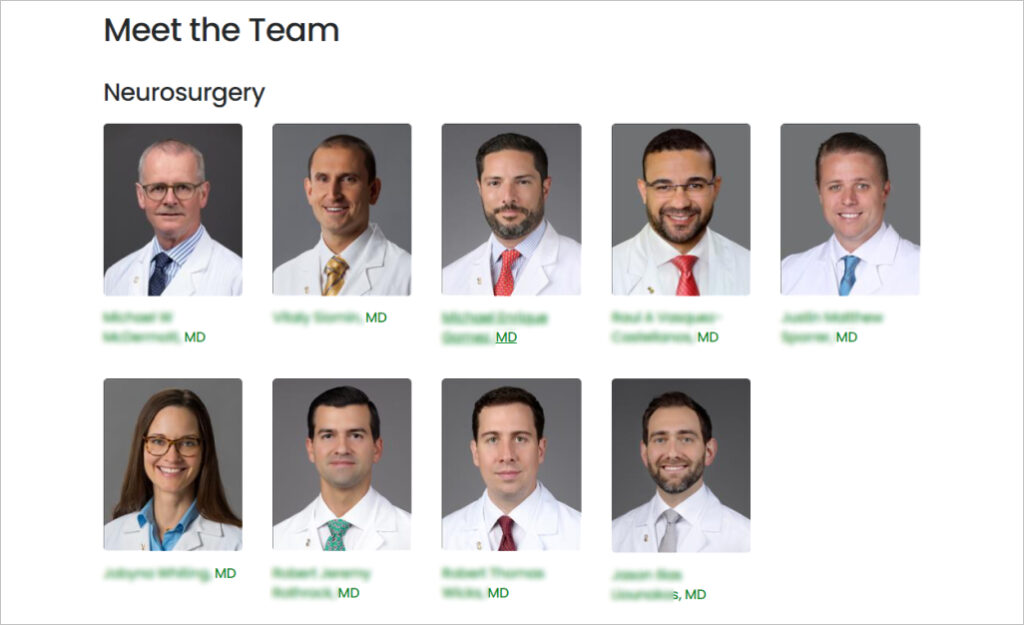
For most patients, dealing with health-related issues is laden with anxiety and can feel clinical (Pardon the pun!). However, adding a human element makes your practice seem more approachable.
Images also help with healthcare SEO as they can be optimized with keywords and strategically placed to make content more compelling or increase click-through rates. When new patients see strong visuals, they engage much more than they would with text alone.
12. Make Sure Your Medical Website’s Navigation Is Intuitive
A website that is confusing or poorly designed and structured creates friction and tests users’ patience. Contrastingly, a well-structured and intuitively designed website not only enhances SEO for medical practices but also directs search engine users to take important actions and provides a pleasant experience.
Intuitive design is integral to better conversions. When you’re using an intuitive website, you know exactly what to do. In this sense, the design is invisible because you never have to stop to think about what to click on next.
Google is a great example of user-centric and intuitive design. It’s virtually impossible to use the website incorrectly, and there’s hardly any learning curve for new users.

Looking to scale or increase your revenue? SEO is proven to grow your business
Our Final Tip: Experience the Impact of Our Medical SEO Services
Healthcare search engine marketing is crucial for medical professionals looking to thrive online. By implementing effective medical SEO strategies, you can unlock numerous advantages, including increased website traffic, enhanced brand recognition, and higher patient volumes. The 12 tactics shared in this post provide a solid foundation for optimizing your healthcare website and boosting its rankings.
If you find yourself in need of professional assistance with healthcare SEO services, our dedicated medical SEO company is here to help. Comrade offers comprehensive solutions tailored specifically for healthcare providers. From website optimization to specialty-based ranking in both organic search results and Google Maps, our proven medical SEO strategies are designed to elevate your online presence and drive tangible results in the form of leads and high ROI.
